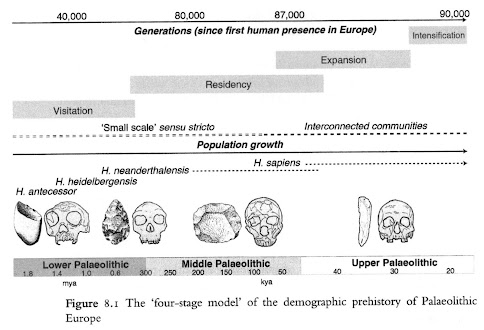As with Are We Smart Enough to Know How Smart Animals Are?, I found this more recent book by Frans de Waal somewhat informative, but, at the same time, annoying to read. The informative aspects relate to his expertise in primates, while the annoying aspects relate to his anecdotal style of writing. Most of his research experience comes from observing primates, and when he writes about them it seems as if he is describing friends and family members who happen to be chimpanzees, bonobos, gorillas, baboons, orangutans or macaques. Rather than focusing on conceptual issues, which are my main interest, he loves to describe the variability of primate behavior within species and between species. In this instance, I think the book would have been more effective if he had stuck to humans, chimpanzees and bonobos, which are closely related.
Socially speaking, we are not that different from chimpanzees and bonobos. Chimpanzee males are larger, stronger and more physically violent than females. They form hierarchies led by alpha males and maintain territories, which involves attacking and killing members of other groups. Males and females spend most of their time living with their own sex. Social tensions are relieved by grooming others. Alpha males usually have a broad range of social skills and do not rule by brute force; they are often respected by others. The dynamics are quite different in bonobo groups, because, though they are also hierarchical in structure, they are led by alpha females instead of males. Bonobo males are closer in size and strength to females and can be controlled by females who work in concert. The females can be violent and aggressive when necessary, but are usually less so than male chimpanzees. Bonobos stand out from other primates in that, comparatively speaking, they are sex maniacs. They behave in a bisexual manner. Females, who have evolved large clitorises, spend a great deal of time with other females in the missionary position rubbing their clitorises together.
To the extent that there is any theme to the book, it is that gender is not a social construct, and that most primates follow similar gender behavioral patterns. Males focus on physical activities and are not interested in child rearing. Females focus on child rearing and self-decoration. Humans differ from other primates mainly in the development of nuclear families. De Waal thinks that the nuclear family arrangement can cause domestic violence, particularly when there are external stresses, such as the pandemic. The book also touches on transgender issues and notes evidence of transgender behavior in one chimpanzee.
The general outlook that de Waal seems to advocate is that we are primarily biological entities, and, as such, many of the categories and classifications that we come up with to explain human behavior are crude oversimplifications or misrepresentations that don't capture the complications of the underlying biological processes. One idea that he specifically rejects is mind-body dualism, which allows people to think that they are not their bodies. As I myself have said before, Simone de Beauvoir herself is guilty of this error. Although de Waal describes himself as a feminist, he says that he has had conflicts with ideologically rigid feminist women.
One observation that I found interesting was that, while male chimpanzees attempt to resolve conflicts with other males, female chimpanzees do not attempt to resolve conflicts with other females:
Given that four out of five female conflicts go unreconciled, it's fair to say that female chimpanzees are touched more deeply and are less willing than males to get over their disagreements. In the wild, too, females rarely make up after fights. They tend to disperse, which makes for an easy solution.
This helps explain why some of the females I've known became dogmatic and inflexible when disagreements arose. There was no discussion, and they simply left.
I was a little disappointed by the limited treatment of transgender issues in the book. This is probably because not much research has been done on the subject. The opposite is true for homosexuality and bisexuality, which are now widely accepted and understood. Some aspects of transgender identity may be explained by genetic differences at conception or hormonal exposure during fetal development. In theory, transgender issues could be handled in exactly the same manner as homosexuality or bisexuality. However, if, like me, you adopt a completely materialistic view of the universe and human life, it seems that you are your body. As a materialist, I have difficulty understanding why someone would make risky physical changes to their body through surgery and hormone therapy in order to match their perceived gender identity to their body. It is possible that further research may justify those procedures, but I am a little concerned that, without proper guidelines, children, left to their own devices, may make poor decisions. For example, at this moment, there are probably millions of socially awkward children who erroneously think that becoming transgender would make them more popular. I think that some research-based guidelines are in order.
